-
This topic is for information and support on the NUT package.
The length of the prior thread has become a bit unwieldy, so I'm moving to a new thread beginning with package version 2.8.1. There is a lot of good content in the old thread that is worth reviewing if you have a spare day or two.
Version history:
2.8.1 2023-11-09 Initial version. -
Notes on remote access to NUT
[Copied from the 2.8.0_2 and below thread thread]
If you want to allow access to the NUT daemon from other hosts, there are two options available. You can either use a port forward in the firewall rules, or you can add a listen directive to upsd.conf.
Option 1: To add a port forward, go to Firewall / NAT / Port Forward, and create a port forward with the following attributes:
Interface: The interface you want to allow access from, usually LAN
Protocol: TCP
Destination: The firewall address matching the interface, usually LAN address.
Destination port: The port you want to use for access, usually 3493
Redirect target IP 127.0.0.1
Redirect target port: 3493In general, this option is simpler because you can easily restrict access by adding a Source Address to the NAT rule.
Option 2: To add a listen directive to NUT, go to Services / UPS / Settings. Use the Display Advanced button to show the Advanced settings section. In the section for upsd.conf, add a line like:
LISTEN 192.168.1.1
where 192.168.1.1 is the address of the interface you want to allow access from. You can also specify IPv6 addresses with the listen directive. Note that if you use this option, you will need to use firewall rules to restrict access to specific source addresses.
It is important to choose one option or the other. DO NOT DO BOTH AT THE SAME TIME.
Regardless of which option above you choose, you will also need to add a user entry in upsd.users. To add the entry, go to Services / UPS / Settings. Use the Display Advanced button to show the Advanced settings section. In the section for upsd.users, add lines like:
[remoteuser]
password = mypassword
upsmon slaveAllowing remote access to NUT on the firewall should not be done casually. If you do allow remote access, it is a good idea to restrict access to trusted source addresses only.
Notes on Synology
Synology's NUT implementation uses hardcoded values for several items:
- UPS Name: "ups"
- Username: "monuser"
- Password: "secret"
If you want pfSense to be able to share a UPS with a Synology system, either as a remote NUT client or a remote NUT server, you must use these values when configuring NUT on pfSense.
Also, if you are connecting pfSense as a client to a NUT server running on a Synology system, you will need to explicitly add the IP address of the pfSense system to the list of "Permitted DiskDstation Devices" in the Synology control panel. Failure to do so will result in a permission denied when attempting the NUT login.
-
[Reserved]
-
Notes on USB quirks
If you are using a locally attached USB UPS, and the driver fails to start, it is likely that there is no USB quirk in FreeBSD for your UPS. You can test this by adding
user=rootto the Additional configuration lines for ups.conf. If this allows NUT to start, this means that there is no quirk for your UPS.
Please do not stop here. Help the world.
You can address this by developing quirk for your UPS, and then you can help others that by submitting the quirk for inclusion in FreeBSD.
The basic format of a quirk for a UPS looks like this:
0x051d 0x0002 0x0000 0xffff UQ_HID_IGNOREWhere
0x051dis the Vendor ID0x0002is the Product ID0x0000is the LowRevision0xffffis the HighRevisionUQ_HID_IGNOREis the USB quirk (ignore)
This quirk tells the operating system to ignore (not attach a driver) to that particular type of USB device when it is connected to the system. By default, if there is no quirk saying to ignore a device, the kernel will attach a default driver to the device. It requires root privileges to replace the default driver which prevents NUT from being able to access the device unless it is running as root. This is why we need to create a quirk to allow NUT to run without root privilege.
To create a new quirk, we need to determine what the appropriate Vendor and Product IDs will be. The following command will dump USB information for your system:
usbconfig -vThis command can generate quite a bit of output. We are looking for a section that looks like this:
ugen0.2: <American Power Conversion Smart-UPS1000 FW:UPS 16.1 / ID1047> at usbus0, cfg=0 md=HOST spd=FULL (12Mbps) pwr=ON (10mA) bLength = 0x0012 bDescriptorType = 0x0001 bcdUSB = 0x0200 bDeviceClass = 0x0000 <Probed by interface class> bDeviceSubClass = 0x0000 bDeviceProtocol = 0x0000 bMaxPacketSize0 = 0x0040 idVendor = 0x051d idProduct = 0x0003 bcdDevice = 0x0001 iManufacturer = 0x0001 <American Power Conversion > iProduct = 0x0002 <Smart-UPS_1000 FW:UPS 16.1 / ID=1047> iSerialNumber = 0x0003 <ASXXXXXXXXX > bNumConfigurations = 0x0001The fields we are interested in are 'idVendor' and 'idProduct'. These fields equate to Vendor ID and Product ID as shown in the quirk format above.
Notice that in the usbconfig output the idVendor field matches the ID in quirk above, but the idProduct field does not match. This is because the vendor introduced a new generation of UPS systems and updated the Product ID. To address this, we need to create a new quirk.
The quirk we want to create looks like this:
0x051d 0x0003 0x0000 0xffff UQ_HID_IGNORE[Note: We are only interested in the Vendor ID and Product ID fields. The other fields will always be the same.]
Now that we have our quirk, we can test it by adding it to the system with the following command:
usbconfig add_dev_quirk_vplh 0x051d 0x0003 0x0000 0xffff UQ_HID_IGNOREFollowing that, disconnect and reconnect the USB cable to the UPS and try to start NUT. If the NUT USB driver starts, you've got your quirk.
Adding the quirk via the usbconfig command is temporary, and does not survive a reboot. To permanently add the quirk, we need to add an entry to /boot/loader.conf.local that looks like this:
hw.usb.quirk.0="0x051d 0x0003 0x0000 0xffff UQ_HID_IGNORE"Note that the number following 'hw.usb.quirk' must be unique, so in the unlikely event you need to add multiple quirks in /boot/loader.conf.local, it would look like this:
hw.usb.quirk.0="0x051d 0x0002 0x0000 0xffff UQ_HID_IGNORE" hw.usb.quirk.1="0x051d 0x0003 0x0000 0xffff UQ_HID_IGNORE"If you develop a new quirk, please let the world know. Either post about it here, or submit it directly to FreeBSD.
Additional information:
Detailed information regarding quirks can be found here.
Full documentation on usbconfig can be found here.
You can see the attached kernel driver with the following command:
usbconfig -d ugen0.2 show_ifdrvwhich will product output like so:
ugen0.2: <American Power Conversion Smart-UPS1000 FW:UPS 16.0 / ID1047> at usbus0, cfg=0 md=HOST spd=FULL (12Mbps) pwr=ON (10mA) ugen0.2.0: uhid0: <American Power Conversion Smart-UPS1000 FW:UPS 16.0 / ID1047, class 0/0, rev 2.00/0.01, addr 4>The second line indicates that there is an attached kernel driver (uhid0).
You can detach the kernel driver with the following command:
usbconfig -d ugen0.2 detach_kernel_driverAfter detaching the driver, or if you have an installed quirk, show_ifdrv will just have the first line:
ugen0.2: <American Power Conversion Smart-UPS1000 FW:UPS 16.0 / ID1047> at usbus0, cfg=0 md=HOST spd=FULL (12Mbps) pwr=ON (10mA)You can see all the relevant quirks in your system with the following command:
usbconfig dump_device_quirks | grep HID_IGNOREThe quirks discussed above will show up like so:
VID=0x051d PID=0x0002 REVLO=0x0000 REVHI=0xffff QUIRK=UQ_HID_IGNORE VID=0x051d PID=0x0003 REVLO=0x0000 REVHI=0xffff QUIRK=UQ_HID_IGNORE -
Call for testing!
We are in a testing/feedback phase for the 2.8.1 pfSense NUT package. Many of you have experienced issues with the 2.8.0 version and are running custom builds. I would like to ask you to test the new package prior to a general release.
The 2.8.1 packages are available from the Redmine issue here. In order to install the package, you must be running 23.09. Be sure to select the correct package for your architecture.
In order to install the package, please use the following steps:
- Have previously installed the NUT package
- Download the new package from Redmine and copy it to your firewall in /tmp
- Disable or stop the NUT service
- Using the command line, remove the old version of NUT:
pkg remove -fy nut - Install the new version of NUT:
pkg install -fy /tmp/nut-devel-2023.10.07_1.pkg - Re-enable or restart the NUT service
If you are able to test, please let me know results. PM is preferred. Please include the following information:
- UPS Type
- Driver (if used)
- Extra Arguments to driver (if used)
Thank you all for your help!
-
 D dennypage referenced this topic on
D dennypage referenced this topic on
-
@dennypage Not sure if this is because I did something stupid but I have updated the package as instructed and as soon as I restarted the NUT service my router immediately shut down completely. Below is what my SSH session showed as it happened.
[23.09-RELEASE][admin@pfSense.irwazu.co.uk]/tmp: pkg remove -fy nut Checking integrity... done (0 conflicting) Deinstallation has been requested for the following 1 packages (of 0 packages in the universe): Installed packages to be REMOVED: nut: 2.8.0_23 Number of packages to be removed: 1 The operation will free 7 MiB. [1/1] Deinstalling nut-2.8.0_23... [1/1] Deleting files for nut-2.8.0_23: 100% ==> You should manually remove the "nut" user. ==> You should manually remove the "nut" group You may need to manually remove /usr/local/etc/nut/ups.conf if it is no longer n eeded. You may need to manually remove /usr/local/etc/nut/upsd.conf if it is no longer needed. You may need to manually remove /usr/local/etc/nut/upsd.users if it is no longer needed. You may need to manually remove /usr/local/etc/nut/upsmon.conf if it is no longe r needed. [23.09-RELEASE][admin@pfSense.irwazu.co.uk]/tmp: pkg install -fy /tmp/armv7_nut- devel-2023.10.07_1.pkg Updating pfSense-core repository catalogue... Fetching meta.conf: 0% pfSense-core repository is up to date. Updating pfSense repository catalogue... Fetching meta.conf: 0% pfSense repository is up to date. All repositories are up to date. Checking integrity... done (0 conflicting) The following 1 package(s) will be affected (of 0 checked): New packages to be INSTALLED: nut-devel: 2023.10.07_1 [unknown-repository] Number of packages to be installed: 1 The process will require 9 MiB more space. [1/1] Installing nut-devel-2023.10.07_1... ===> Creating groups. Using existing group 'nut'. Using existing group 'dialer'. ===> Creating users Using existing user 'nut'. Extracting nut-devel-2023.10.07_1: 100% 124 B 0.1kB/s 00:01 Broadcast Message from root@pfSense.irwazu.co.uk (no tty) at 17:21 GMT... Communications with UPS EatonUPS lost Broadcast Message from root@pfSense.irwazu.co.uk (no tty) at 17:21 GMT... Communications with UPS EatonUPS established Broadcast Message from root@pfSense.irwazu.co.uk (no tty) at 17:21 GMT... UPS EatonUPS: administratively OFF or asleep Broadcast Message from root@pfSense.irwazu.co.uk (no tty) at 17:21 GMT... UPS EatonUPS on battery Broadcast Message from root@pfSense.irwazu.co.uk (no tty) at 17:21 GMT... Executing automatic power-fail shutdown Broadcast Message from root@pfSense.irwazu.co.uk (no tty) at 17:21 GMT... Auto logout and shutdown proceeding *** FINAL System shutdown message from root@pfSense.irwazu.co.uk *** System going down IMMEDIATELY Broadcast Message from root@pfSense.irwazu.co.uk (/dev/console) at 17:22 GMT... NUT killing power...I had not removed the "interruptonly" from the configuration.
I unplugged the USB, power cycled the router, removed the "interruptonly" setting, and re-connected the USB from the UPS. After doing this everything appears to work as expected.
Hardware: Eaton Ellipse Eco 650
Driver: usbhid
I have the "LISTEN" configuration to make the daemon available to other kit connected to the UPS. -
@DavidIr That is strange to say the least. Are you sure the NUT service was down? Do you have a service watchdog that might have restarted it?
-
@dennypage for step 6 of the installation instructions I went in to the pfsense UI and pressed the restart button on the NUT service. Was that the step I got wrong?
-
@DavidIr I don't see anything that you did wrong. Trying to understand how the shutdown could have been triggered.
-
Hello, I installed this version following the step-by-step provided above, and everything is working.
Send a PM to the OP as he said is preferred. Device: SG-4100 | UPS: Eaton E5 650USB -
So far so good, resolves my issues also with a CP1500AVRLCDa via USB
-
nothing for CE 2.7.0 yet ? :(
-
@vizi0n said in NUT Package (2.8.1 and above):
nothing for CE 2.7.0 yet ?
I believe 2.7.1 will be the minimum version on the CE side, similar to how 23.09 is required on the Plus side.
-
@dennypage indeed, installing 2.7.1RC also installed nut-devel-2023.10.07_1 under the 2.8.1 name.
So far, USB connectivity is already better ! Yay. Thanks
-
@dennypage said in NUT Package (2.8.1 and above):
rican Power Conversion Smart-UPS1000 FW:UPS 16.1 / ID1047>
Hello,
for my RIELLO model Vision VST1100
https://www.riello-ups.it/products/1-gruppi-di-continuita/54-vision[2.7.0-RELEASE][admin@xxxxxxxxxxx-pfSense.home.arpa]/root: usbconfig -d ugen2.2 show_ifdrv ugen2.2: <Cypress Semiconductor USB to Serial> at usbus2, cfg=0 md=HOST spd=LOW (1.5Mbps) pwr=ON (100mA)in pfsense i have this data from command usbconfig -v
ugen2.2: <Cypress Semiconductor USB to Serial> at usbus2, cfg=0 md=HOST spd=LOW (1.5Mbps) pwr=ON (100mA) bLength = 0x0012 bDescriptorType = 0x0001 bcdUSB = 0x0200 bDeviceClass = 0x0000 <Probed by interface class> bDeviceSubClass = 0x0000 bDeviceProtocol = 0x0000 bMaxPacketSize0 = 0x0008 idVendor = 0x04b4 idProduct = 0x5500 bcdDevice = 0x0001 iManufacturer = 0x0001 <Cypress Semiconductor> iProduct = 0x0002 <USB to Serial> iSerialNumber = 0x0000 <no string> bNumConfigurations = 0x0001 Configuration index 0 bLength = 0x0009 bDescriptorType = 0x0002 wTotalLength = 0x0029 bNumInterfaces = 0x0001 bConfigurationValue = 0x0001 iConfiguration = 0x0003 <Sample HID> bmAttributes = 0x0080 bMaxPower = 0x0032 Interface 0 bLength = 0x0009 bDescriptorType = 0x0004 bInterfaceNumber = 0x0000 bAlternateSetting = 0x0000 bNumEndpoints = 0x0002 bInterfaceClass = 0x0003 <HID device> bInterfaceSubClass = 0x0000 bInterfaceProtocol = 0x0000 iInterface = 0x0004 <EndPoint1 Interrupt Pipe> Additional Descriptor bLength = 0x09 bDescriptorType = 0x21 bDescriptorSubType = 0x11 RAW dump: 0x00 | 0x09, 0x21, 0x11, 0x01, 0x00, 0x01, 0x22, 0x25, 0x08 | 0x00 Endpoint 0 bLength = 0x0007 bDescriptorType = 0x0005 bEndpointAddress = 0x0081 <IN> bmAttributes = 0x0003 <INTERRUPT> wMaxPacketSize = 0x0008 bInterval = 0x000a bRefresh = 0x0000 bSynchAddress = 0x0000 Endpoint 1 bLength = 0x0007 bDescriptorType = 0x0005 bEndpointAddress = 0x0002 <OUT> bmAttributes = 0x0003 <INTERRUPT> wMaxPacketSize = 0x0008 bInterval = 0x000a bRefresh = 0x0000 bSynchAddress = 0x0000[2.7.0-RELEASE][admin@xxxxxx-pfSense.home.arpa]/root:
[2.7.0-RELEASE][admin@xxxxxx-pfSense.home.arpa]/root: usbconfig -d ugen2.2 detach_kernel_driver
[2.7.0-RELEASE][admin@xxxxxx-pfSense.home.arpa]/root: usbconfig -d ugen2.2 show_ifdrv
ugen2.2: <Cypress Semiconductor USB to Serial> at usbus2, cfg=0 md=HOST spd=LOW (1.5Mbps) pwr=ON (100mA)
[2.7.0-RELEASE][admin@xxxxxx-pfSense.home.arpa]/root:
[2.7.0-RELEASE][admin@xxxxxx-pfSense.home.arpa]/root: usbconfig dump_device_quirks | grep HID_IGNORE
VID=0x0b05 PID=0x1726 REVLO=0x0000 REVHI=0xffff QUIRK=UQ_HID_IGNORE
VID=0x051d PID=0x0002 REVLO=0x0000 REVHI=0xffff QUIRK=UQ_HID_IGNORE
VID=0x051d PID=0x0003 REVLO=0x0000 REVHI=0xffff QUIRK=UQ_HID_IGNORE
VID=0x050d PID=0x0375 REVLO=0x0000 REVHI=0xffff QUIRK=UQ_HID_IGNORE
VID=0x050d PID=0x0551 REVLO=0x0000 REVHI=0xffff QUIRK=UQ_HID_IGNORE
VID=0x050d PID=0x0750 REVLO=0x0000 REVHI=0xffff QUIRK=UQ_HID_IGNORE
VID=0x050d PID=0x0751 REVLO=0x0000 REVHI=0xffff QUIRK=UQ_HID_IGNORE
VID=0x050d PID=0x0900 REVLO=0x0000 REVHI=0xffff QUIRK=UQ_HID_IGNORE
VID=0x050d PID=0x0910 REVLO=0x0000 REVHI=0xffff QUIRK=UQ_HID_IGNORE
VID=0x050d PID=0x0912 REVLO=0x0000 REVHI=0xffff QUIRK=UQ_HID_IGNORE
VID=0x050d PID=0x0980 REVLO=0x0000 REVHI=0xffff QUIRK=UQ_HID_IGNORE
VID=0x050d PID=0x1100 REVLO=0x0000 REVHI=0xffff QUIRK=UQ_HID_IGNORE
VID=0x0764 PID=0x0005 REVLO=0x0000 REVHI=0xffff QUIRK=UQ_HID_IGNORE
VID=0x0764 PID=0x0501 REVLO=0x0000 REVHI=0xffff QUIRK=UQ_HID_IGNORE
VID=0x0764 PID=0x0601 REVLO=0x0000 REVHI=0xffff QUIRK=UQ_HID_IGNORE
VID=0x047c PID=0xffff REVLO=0x0000 REVHI=0xffff QUIRK=UQ_HID_IGNORE
VID=0x04b4 PID=0xfd13 REVLO=0x0000 REVHI=0xffff QUIRK=UQ_HID_IGNORE
VID=0x1163 PID=0x0100 REVLO=0x0000 REVHI=0xffff QUIRK=UQ_HID_IGNORE
VID=0x1d34 PID=0x0004 REVLO=0x0000 REVHI=0xffff QUIRK=UQ_HID_IGNORE
VID=0x04d8 PID=0x0002 REVLO=0x0000 REVHI=0xffff QUIRK=UQ_HID_IGNORE
VID=0x04d8 PID=0xc001 REVLO=0x0000 REVHI=0xffff QUIRK=UQ_HID_IGNORE
VID=0x06da PID=0xffff REVLO=0x0000 REVHI=0xffff QUIRK=UQ_HID_IGNORE
VID=0x10af PID=0x0004 REVLO=0x0000 REVHI=0xffff QUIRK=UQ_HID_IGNORE
VID=0x10af PID=0x0001 REVLO=0x0000 REVHI=0xffff QUIRK=UQ_HID_IGNORE
VID=0x0463 PID=0x0001 REVLO=0x0000 REVHI=0xffff QUIRK=UQ_HID_IGNORE
VID=0x0463 PID=0xffff REVLO=0x0000 REVHI=0xffff QUIRK=UQ_HID_IGNORE
VID=0x0d9f PID=0x00a2 REVLO=0x0000 REVHI=0xffff QUIRK=UQ_HID_IGNORE
VID=0x0d9f PID=0x00a3 REVLO=0x0000 REVHI=0xffff QUIRK=UQ_HID_IGNORE
VID=0x0d9f PID=0x00a4 REVLO=0x0000 REVHI=0xffff QUIRK=UQ_HID_IGNORE
VID=0x0d9f PID=0x00a5 REVLO=0x0000 REVHI=0xffff QUIRK=UQ_HID_IGNORE
VID=0x0d9f PID=0x00a6 REVLO=0x0000 REVHI=0xffff QUIRK=UQ_HID_IGNORE
VID=0x09ae PID=0x1003 REVLO=0x0000 REVHI=0xffff QUIRK=UQ_HID_IGNORE
VID=0x09ae PID=0x1007 REVLO=0x0000 REVHI=0xffff QUIRK=UQ_HID_IGNORE
VID=0x09ae PID=0x1008 REVLO=0x0000 REVHI=0xffff QUIRK=UQ_HID_IGNORE
VID=0x09ae PID=0x1f06 REVLO=0x0000 REVHI=0xffff QUIRK=UQ_HID_IGNORE
VID=0x09ae PID=0x1f0a REVLO=0x0000 REVHI=0xffff QUIRK=UQ_HID_IGNORE
VID=0x09ae PID=0x2005 REVLO=0x0000 REVHI=0xffff QUIRK=UQ_HID_IGNORE
VID=0x09ae PID=0x2007 REVLO=0x0000 REVHI=0xffff QUIRK=UQ_HID_IGNORE
VID=0x09ae PID=0x3012 REVLO=0x0000 REVHI=0xffff QUIRK=UQ_HID_IGNORE
VID=0x09ae PID=0x3014 REVLO=0x0000 REVHI=0xffff QUIRK=UQ_HID_IGNORE
VID=0x09ae PID=0x4001 REVLO=0x0000 REVHI=0xffff QUIRK=UQ_HID_IGNORE
VID=0x09ae PID=0x4002 REVLO=0x0000 REVHI=0xffff QUIRK=UQ_HID_IGNORE
VID=0x09ae PID=0x4003 REVLO=0x0000 REVHI=0xffff QUIRK=UQ_HID_IGNORE
VID=0x05ac PID=0x1290 REVLO=0x0000 REVHI=0xffff QUIRK=UQ_HID_IGNORE
VID=0x05ac PID=0x1292 REVLO=0x0000 REVHI=0xffff QUIRK=UQ_HID_IGNORE
VID=0x0665 PID=0x5161 REVLO=0x0000 REVHI=0xffff QUIRK=UQ_HID_IGNORE
VID=0x04b4 PID=0x0bad REVLO=0x0000 REVHI=0xffff QUIRK=UQ_HID_IGNORE
VID=0x1781 PID=0x083e REVLO=0x0000 REVHI=0xffff QUIRK=UQ_HID_IGNORE
VID=0x1781 PID=0x083f REVLO=0x0000 REVHI=0xffff QUIRK=UQ_HID_IGNORE
VID=0x1dd5 PID=0x5000 REVLO=0x0000 REVHI=0xffff QUIRK=UQ_HID_IGNORE
[2.7.0-RELEASE][admin@xxxxxx-pfSense.home.arpa]/root:Is THIS my new quirk for Riello VST1100?
hw.usb.quirk.0="0x04b4 0x5500 0x0000 0xffff UQ_HID_IGNORE"
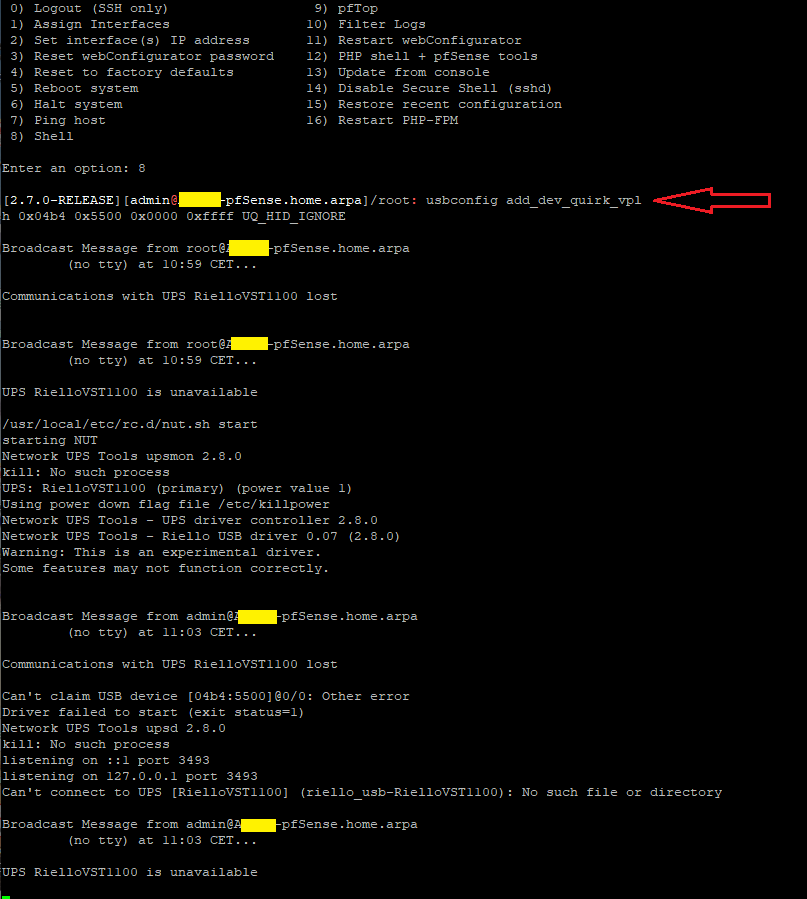
It seems like the new quirk isn't working
one moment....correction....I disconnected the USB cable and reconnected...I re-executed the command: "/usr/local/etc/rc.d/nut.sh start"
Result:
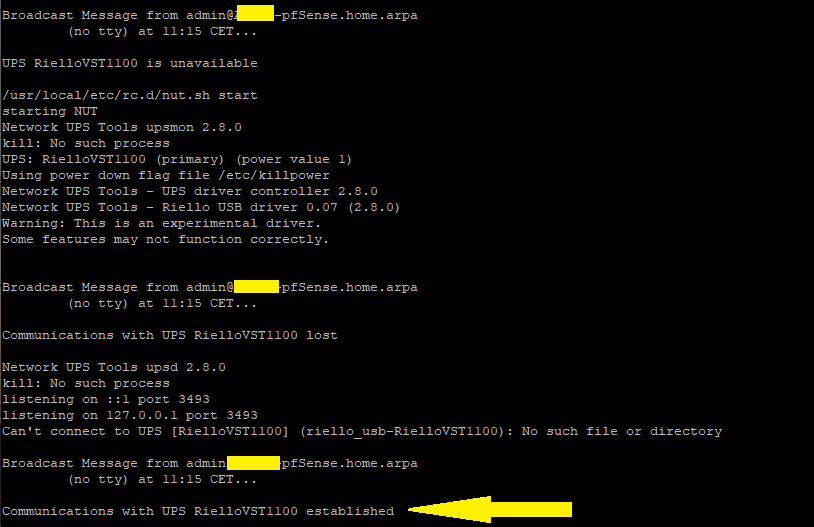
Have we reached the final solution?



Can I add my new quirk into the bootloader?
Can you write me the complete command?
.......
maybe I found it, can you confirm?
nano /boot/loader.conf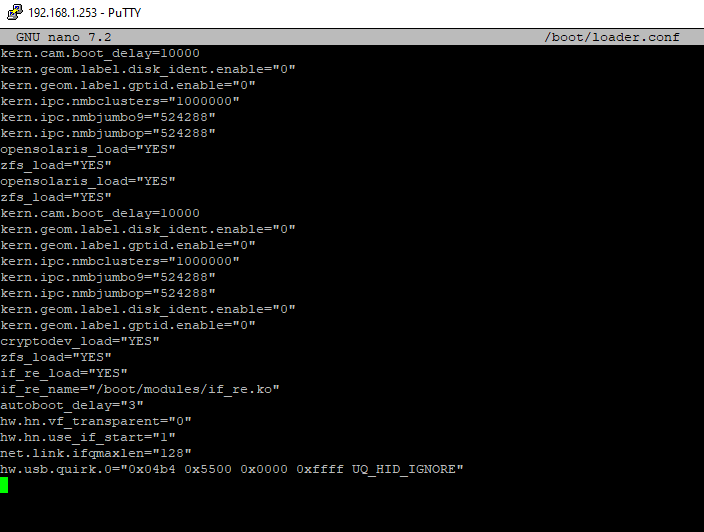
I shut down the system and restart
OK!!!
UPS Working after system reboot.
Without any settings Extra arguments to the driver (optional)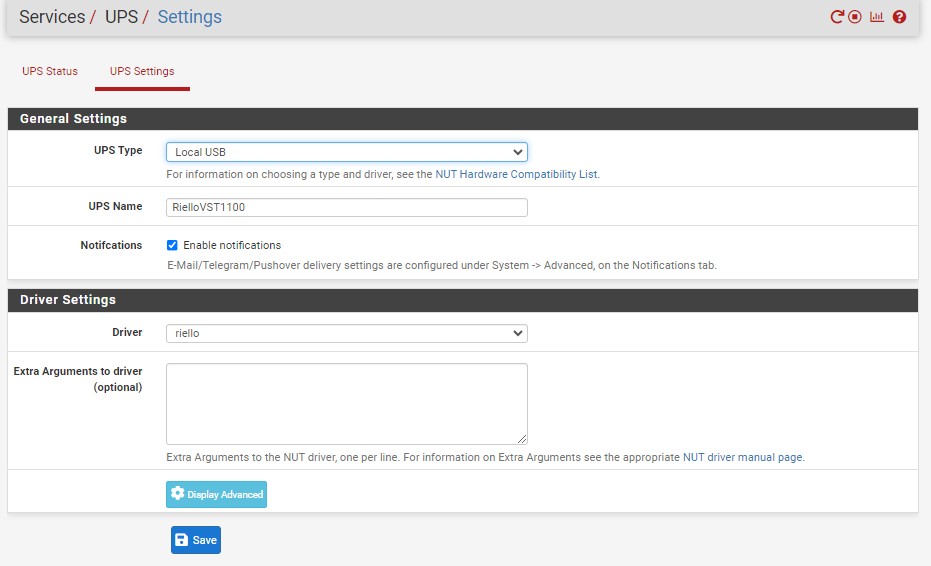
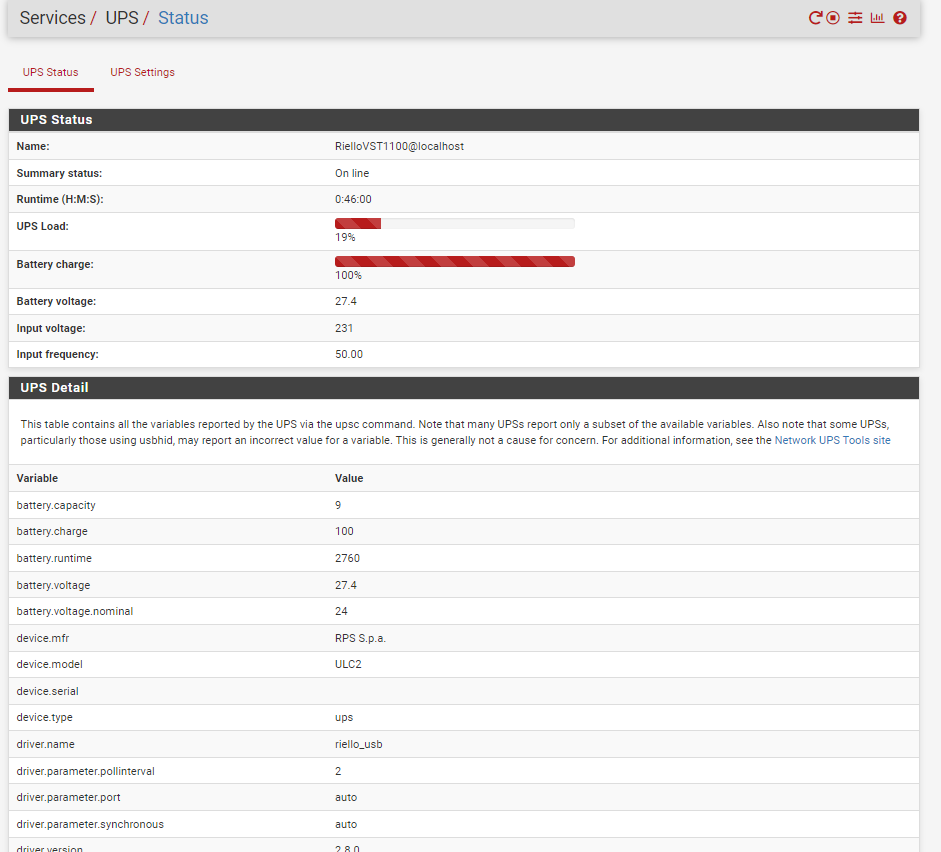
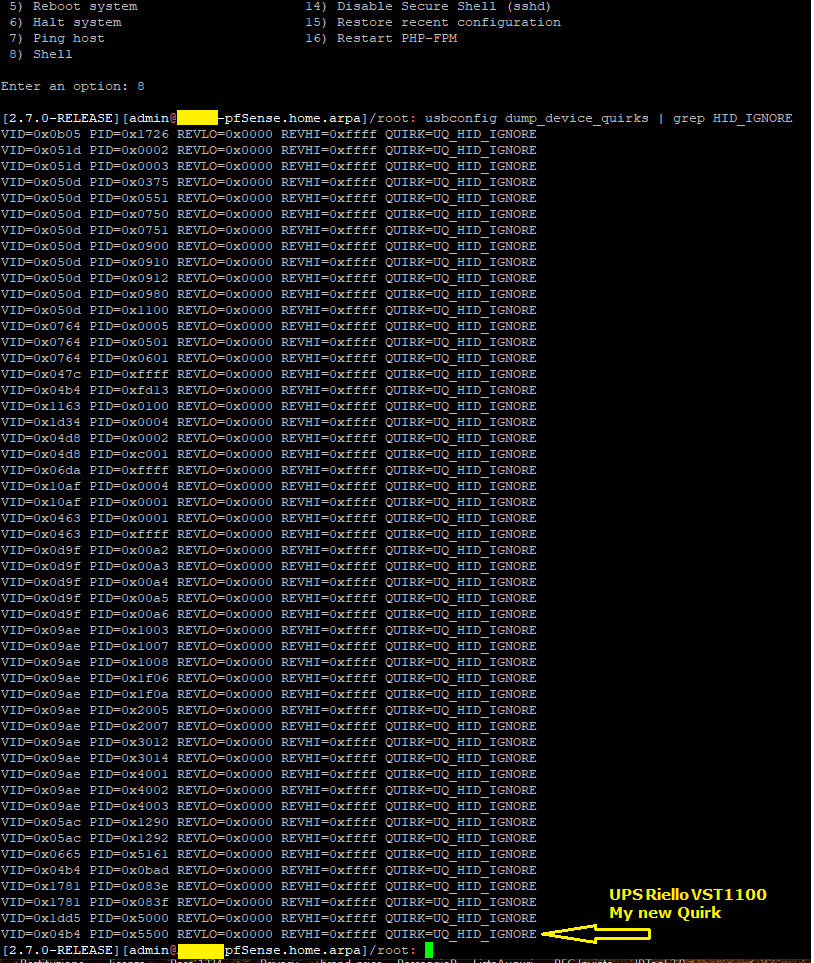
hw.usb.quirk.0="0x04b4 0x5500 0x0000 0xffff UQ_HID_IGNORE"
I also own UPS Riello Sentinel Pro 2200 and Riello Sentinel Dual SDU 6Kw.
As soon as I have time I'll check if the quirk also applies to this other UPS or if it has a different one
.Test in progress ........
Confirm: Quirk for Riello VST1100 also works on Riello Sentinel Pro 2200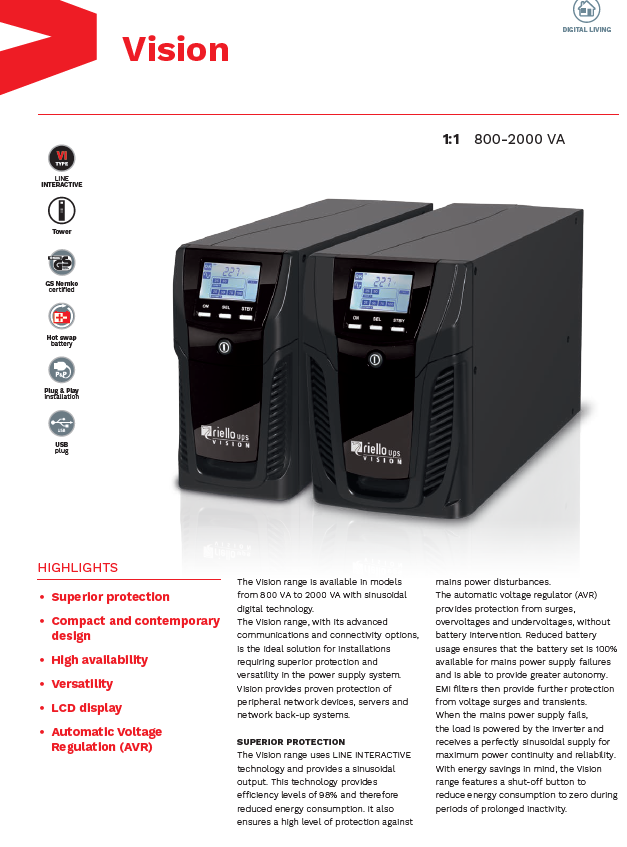
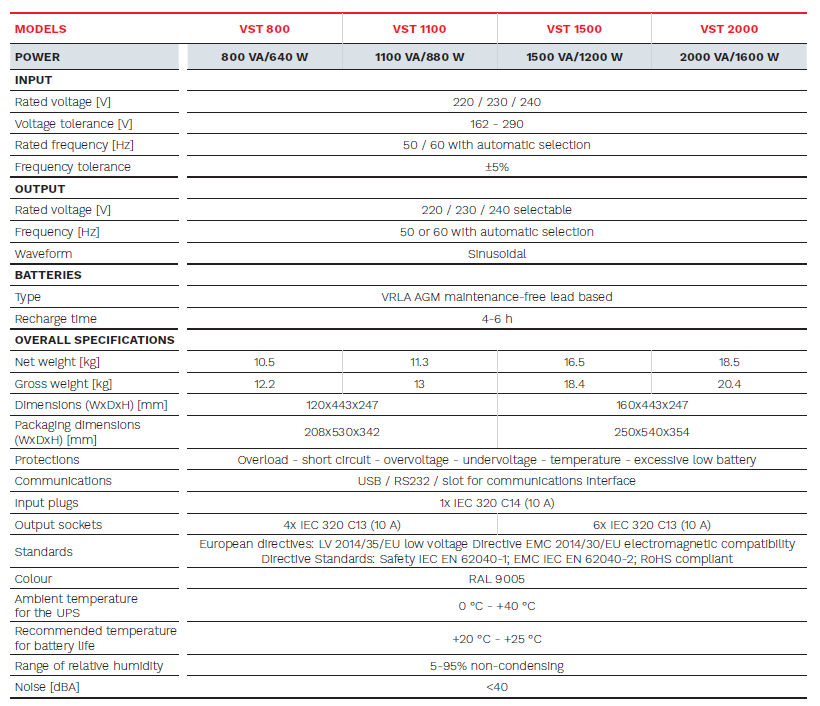

-
 U Unoptanio referenced this topic on
U Unoptanio referenced this topic on
-
@Unoptanio Good job!
-
 D dennypage referenced this topic on
D dennypage referenced this topic on
-
 G Gertjan referenced this topic on
G Gertjan referenced this topic on
-
 D dennypage referenced this topic on
D dennypage referenced this topic on
-
I'm on 2.7CE, recently updated to NUT package 2.8.1 and started to have issues connecting to the remote NUT server. I have a UPS plugged into another machine (truenas) and pfSense connects to that machine over the network to get the UPS data. Has been working great since I've set this up a couple of years ago, but now the NUT service fails to start. Nothing in the System logs.
I've added "RUN_AS_USER root" to the upsmon.conf and "user=root" to ups.conf. But those didn't have any effect.
Any other suggestions?
-
@dmitri I believe you need to be either on pfSense CE 2.7.1 or pfSense Plus 23.09 for NUT 2.8.1 to work.
-
@KarB1NE hmm. I'll give that a try in the coming days. I'm surprised that being on 2.7 it allows you to update to a package not compatible with that version. But certainly, that could be the issue. Thanks!
-
@dmitri said in NUT Package (2.8.1 and above):
I'm on 2.7CE, recently updated to NUT package 2.8.1
Can you clarify? Did you update the NUT package my hand?
Currently, for pfSense 23.09 or 2.7.0 I would expect NUT 2.8.0_2 as the package version. NUT 2.8.1 would be expected with either pfSense 23.09 or 2.7.1 only as a test version only.
Copyright 2025 Rubicon Communications LLC (Netgate). All rights reserved.